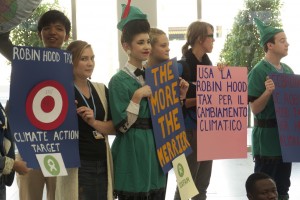Search Results for Tag: industry
Hit the buttons to beat the “Mermaid Death Squad”
What sounds like a name for a pretty cool comic metal band is a new online game created by Greenpeace. It’s meant to create awareness about unsustainable tuna fishing. It sets you up against some real nasty-looking, dangerous creatures who want to put you in a tuna can. Greenpeace gives you the chance to battle some well known canned tuna brands – Chicken of the Sea, Bumble Bee and Mermaid – or at least iterations of their mascots. And make sure you don’t get caught.
The idea behind this pacman-like arcade game is obvious. The industrial tuna fishing industry’s big ships catch a lot more than just tuna. Sharks, manta rays, turtles and several marine creatures are caught up and killed every day in the fishing nets. The canned tuna brands mentioned above are the bad guys who use Fish Aggregating Devices (FADs) and longlines to kill an estimated 100,000 tons of bycatch, the games explains.
So it’s up to you to help. Choose to be a shark, manta ray or turtle racing down the aisles of a stylized supermarket to free the tuna from the cans before the bad guys catch you. If you lose, it’s literally game over for the ocean.
Polluted policies and Robin Hood taxes
 Author: Kerstin Schnatz
Author: Kerstin Schnatz
At the beginning of the second week of climate negotiations in Doha, activists from around the world showed their state delegates how to make the conference a success. Redirecting the flow of money was at the top of the agenda in two actions.
Take it from the rich
Wind farms, solar panels and biogas plants are a great idea to tackle climate change – but they do not come for free. Especially developing countries struggle to raise the money for green energies. On the other hand, those who live in industrialized countries and are thus most responsible for today’s climate change, have much more money. So why not take it from the rich and give it to the poor? In our short video, Tim “Robin” Gore from Oxfam explains the idea of a Robin Hood tax.
Tim Gore, Oxfam International from DW_Global Ideas on Vimeo.
Kick out the fossil fuel lobby
According to a activists from SustainUs and the Young Arab Climate Movement (YACM), the industrialized countries should clean up the mess in their own backyards first. Such as Canada who has been awarded the “Fossil of the Day Award” today – in memory of having been the first country ever to have formally pulled out of the Kyoto Protocol.
The negative award for her own country will not surprise Neelam Khare. The student from Vancouver stresses, that Canada could have long taken the lead in changing its own energy production towards renewables, if the influence of the oil industry wasn’t so big. Hundreds of thousands of dollars were spent on lobbying every day and millions “to fund think tanks that publish denialist junk science” to discredit climate change as a real problem.
Neelam Khare, Canadian Youth Delegation (CYD) from DW_Global Ideas on Vimeo.
Climate Travel Guide to Qatar, COP18 in mind
Qatar is the first Middle East country to host a major UN climate change conference. Traditionally, host countries have a big responsibility – their diplomatic skills can make a conference outcome a fail or a success.
This year, the Qatari government has a lot on the plate: A new trading scheme for CO2 emissions has to be found. The old one, agreed in Kyoto in 1996, ends in just a few weeks with the beginning of the new year.
To get a better idea of the oil rich host country of this years Climate Summit, we put togethter some facts and figures for you:
Capital: Doha
Number of inhabtiants: 1.9 Million
Ethnicty: Arab 40%, Indian 18%, Pakistani 18%, Iranian 10%
Religion: Muslim 77.5%, Christian 8.5%, other 14%
Energy mix: 100% electricity from fossil fuels
CO2 emissions per capita: 40 tons per capita. That is the largest in the world.
Food and water resources: produces fruits, vegetables; poultry, dairy products, beef; fish, before Qatar became a big player in oil and gas it was a poor pearl fisher country
Industries: liquefied natural gas, oil production and refining, ammonia, fertilizers, petrochemicals, steel reinforcing bars, cement and others
Civil Society: mixed legal system of civil law and Islamic law
Qatar is probably not the first place you have in mind for a climate conference. We also thought about it and came up with this little information film about the sense or non-sense of climate conferences like COP18:
In Germany, 2011 was sunnier than ever
 No, no. Not what you might think. With a summer just as miserably rainy as the ones before and a winter mild but overcast as ever, Germany probably has not clocked more hours of sun shine than usual last year.
No, no. Not what you might think. With a summer just as miserably rainy as the ones before and a winter mild but overcast as ever, Germany probably has not clocked more hours of sun shine than usual last year.
But price hikes in fossil fuels and plummeting costs for solar energy systems have lead Germans to opt for solar energy big time in 2011. 18 billion kilowatt-hours to be precise. That’s a staggering 60 percent more in solar electricity output than the previous year, the German Solar Industry Association announced. In 2011 Germans slapped a record number of solar panels onto rooftops and walls of their homes, public buildings and industry installations. By November the one Millionth photo-voltaic system was connected to the grid.
What’s more, even from the economics point of view nuclear power is beginning to look decidedly unsexy compared to solar power – something that die-hard supporters of nuclear hadn’t deemed possible in the foreseeable future. And that’s not just because better economies of scale and new technology are lowering the price tag on solar. Not least due to Fukushima new nuclear power plants have simply become uninsurable.





Feedback